Personality Development
Personality Development

In the Name of Allâh, the Most Beneficent, the Most Merciful
From Sahl ibn Aa'd who said that Allâh's Messenger (salAllâhu 'alaihi wa'sallam) said: "Jibreel came to me and said: O Muhammad! Live as you will for you must certainly die; love whom you will since you must certainly leave him; act as you will since you shall certainly be given due reward for it; know that the believers eminence is his standing in prayer during the night, and his honour is having sufficiency without dependency upon the people."
Reported by al-Haakim (4/324)
..So, Do Not Fear Them!
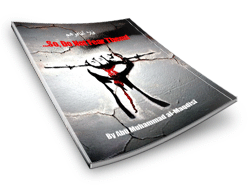
By Abu Muhammad al-Maqdisi. "So do not fear them, and fear Me if you are believers". An Encouragement to Be Firm on the Truth, Openly Express It, and to Not Fear the Helpers of the Tyrants. Translated by Abu Sabaya.
Courtesy of Iskandrani
The Scales of Allah

By the martyred Imam ‘Abdullah ‘Azzam (May Allah have Mercy upon him). “…This is the cream of the people. Search for it. Live with it. Travel with it as your guide and under its leadership. Worship Allah by way of the light that you see and hear from them…”. Translated by Abu Sabaya.
Being True With Allah
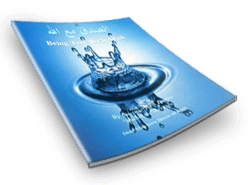
By the martyred Imam ‘Abdullah ‘Azzam (May Allah have Mercy upon him). “…the biggest problem facing Islam today is the lack of the sincere and truthful amongst those who are working for Allah, except for those few hidden, pious, and pure people who were made for leading nations, and were made for navigating the ship…”. Translated by Abu Sabaya.
From the Characteristics of the Salaf
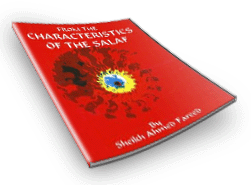
By: Sheikh Ahmed Fareed. This book offers a glimpse into the lives of those who have been praised by both Allah and His Messenger in general. Written in easy English and specially adapted for those who speak it as a first language, it is an invaluable aid to developing one’s character in the footsteps of those who lived and worshipped Allah honourably. It is based on an original Arabic compilation and has been checked for authenticity. People of all ages and learning should be able to benefit from this book. The style facilitates vitally needed reflection on this topic and makes for a great gift to anyone for whom we care.
The Evil of Craving for Wealth and Status

Imaam al-Haafidh Ibn Rajab al-Hanbalee
Many a man has led his soul into destruction by that which he covets. Desiring the riches of this world, recognition and authority amongst the people – it was a trial for the nations of the past and many of us relentlessly chase after it today. We hope that this valuable book highlights the evil consequences of craving after wealth and status and how that can corrupt the Deen of the Muslim. We pray that this realisation causes our brothers and sisters to race one another in hastening towards forgiveness from Allaah, seeking the best provision in the Hereafter – aameen. This is the English translation of the book Sharh Hadeeth Maa Dhi`baan Jaa`I’aan.. (Explanation of the Hadeeth: Two Hungry Wolves…”) by the esteemed scholar of Ahlus-Sunnah wal Jamaa’ah, Imaam al-Haafidh Ibn Rajab al-Hanbalee (d.795h).
The Way to Patience & Gratitude
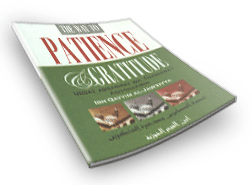
By Ibn Qayyim Al-Jawziyya
Patience and Gratitude are the keys to success in this world and the next, as Imam Ibn Qayyim Al-Jawziyya explains in a beautiful Manner in this Book. In the name of God, Most Gracious, Most Merciful By the Time, Verily Man is in loss, Except such as have Faith, and do righteous deeds, and (join together) in the mutual teaching of Truth, and of Patience and Constancy.
There is also an abridged version of this book translated as Patience and Gratitude Ibn Qayyim al Jawziyyah (691 AH).
The Prophet's Methods Of Correcting People's Mistakes
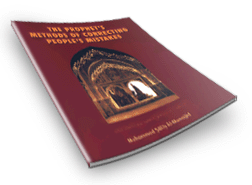
Muhammad Salih al-Munajjid
There are many teaching methods with different means and aids. Correcting mistakes is one of these teaching methods and educationalists call is the "remedial method." Correcting people's mistakes is essential if teaching people is the aim. Correcting mistakes is a divine method the Prophet (pbuh) practiced as the Qur'an was sometimes revealed to correct some mistakes of the Sahabah (companions of the Prophet). The Prophet (pbuh) was divinely guided in correcting the mistakes of people. So his methods are the best mankind has ever known. Following the example of the Prophet (pbuh) is therefore the best approach if one is really keen to teach Islamic knowledge and all the other branches of knowledge. The author has in this book compiled many methods of the Prophet (pbuh) for teaching people and correcting their mistakes. This book, as such, is indispensable for everyone who is concerned with education in general, and Islamic knowledge in particular.
Dealing with Worries and Stress
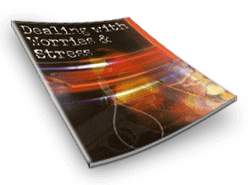
Muhammad Salih al-Munajjid
It is the nature of this life that people will suffer from worries and stress, because this world is the place of disease, hardship and suffering. It is also the nature of this life that people have to put with suffering and hardship for various reasons. So people feel regret for what has happened in the past, anxious about that may happen in the future, and worried about what is going on in the present. The things that cross our mind and make us feel distressed are things in the past that have caused grief, things in the future that we are worried about, and things in the present which concern us.
People react differently to stress and worries, depending on how many things are concerning them, whether the worry is continuous or not, and on whether they have faith in their hearts or are rebellious and sinful. We may describe people's hearts as being of two types: either the heart is the throne of Allaah, filled with light, life, happiness, joy and all the treasures of goodness; or it is the throne of Shaytaan, wherein is distress, darkness, death, grief, worry and anxiety.
Al-Akhlâq wa’l-Siyar (Morals and Behaviour)
By Ibn Hazm al-Andalusi. I have gathered together in this book numerous ideas which Allâh, the provider of intellect, has enabled me to profit from as day succeeded day, [and year succeeded year] and circumstances altered, permitting me to understand the vicissitudes of fate and to control its fluctuations, to the extent that I have devoted the larger part of my life to it. I have chosen to master these problems by study and contemplation, rather than throw myself into the various sensual pleasures which attract most souls on this earth, and rather than amass unnecessary wealth. I have gathered together all my observations into this book in the hope that the Almighty may allow it to benefit whichever of His servants He wishes who has access to [is capable of understanding] my book, in the matters over which I have slaved, devoting all my efforts to them and reflecting at length upon them. I hope that it will be well received, and I present it with good intentions and blessings [with a good heart].The Many Dangers of the Tongue
Compiled by Imraan Hussein. May Allah, the Most High assist us to purify our tongues, and avoid its evil consequences. According to Ibn`Umar, the thing that needs the most purification by any person, is his tongue. Let us guard our tongues from these evils, lest our works be destroyed. Remember the statement of the Prophet (peace be upon him) to Mu`aadh, may Allah be pleased with him:"...then he (peace be upon him) said "Shall I not tell you of what control all that? I said: "Yes, O Messenger of Allah, and he took hold of his tongue and said: "Restrain this. " I said "O Prophet of Allah, will what we say be held against us? He (peace be upon him) said: "May your mother be bereaved for you, O Mu'adh! Is there anything that topples people on their faces - or he said on their noses - into the Hell fire, other than the harvest of their tongues. " [At-Tirmidhi]40 Hadeeth on the Islamic Personality
By Shaikh Salim al-AmryShaikh Salim al-Amry is from the United Arab Emirates. He is a Computer Engineer by profession, however has spent a major part of his youth studying under different scholars. He has taken the effort to obtain knowledge of the different sciences of Islam including Aqidah, Usool, Hadeeth, Fiqh, Tafseer, Arabic language and more. His teachers include: Shaikh Ali Khashshan and Shaikh Mahmood 'Atiyyah, who were two of the first students of Shaikh Albani and under both Shaikh Salim studied Aqidah.
40 Hadeeth on the Islamic Personality 1-2
5.31 MB

40 Hadeeth on the Islamic Personality 2-4
5.67 MB

40 Hadeeth on the Islamic Personality 5-6
6.38 MB

40 Hadeeth on the Islamic Personality 7-8
5.22 MB

40 Hadeeth on the Islamic Personality 9-11
5.39 MB

40 Hadeeth on the Islamic Personality 12-13
6.12 MB

40 Hadeeth on the Islamic Personality 14
5.38 MB

40 Hadeeth on the Islamic Personality 15-16
7.97 MB

40 Hadeeth on the Islamic Personality 17-18
5.34 MB

40 Hadeeth on the Islamic Personality 19-20
4.68 MB

40 Hadeeth on the Islamic Personality 21
3.95 MB

40 Hadeeth on the Islamic Personality 22-24
5.64 MB

40 Hadeeth on the Islamic Personality 25
4.55 MB

40 Hadeeth on the Islamic Personality 26
4.51 MB

40 Hadeeth on the Islamic Personality 27-28
4.66 MB

40 Hadeeth on the Islamic Personality 29-31
5.31 MB

40 Hadeeth on the Islamic Personality 32-35
4.72 MB

40 Hadeeth on the Islamic Personality 36-40
6.2 MB

 Islamic Books,
Islamic Teachings,
Kalamullah,
Muslim Men,
Muslim Women,
Personality Development
Islamic Books,
Islamic Teachings,
Kalamullah,
Muslim Men,
Muslim Women,
Personality Development
This entry was posted on Sunday, October 18, 2009 , 8:03 AM. You can follow any responses to this entry through the RSS 2.0 feed. or you can leave your own response below.

 or
or 







